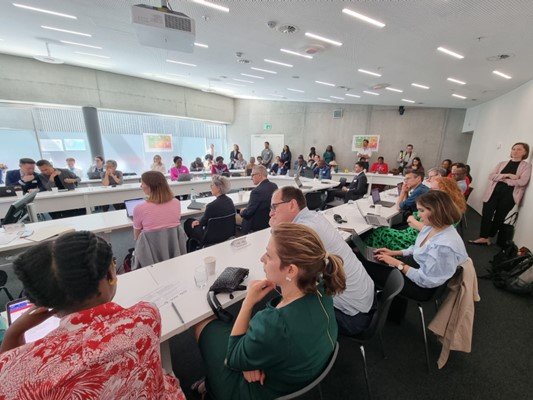In a significant stride toward achieving universal health coverage (UHC) and health equity, the World Health Assembly (WHA) recently endorsed a groundbreaking resolution on strengthening diagnostics capacity. This resolution, passed during the 76th World Health Assembly last month, is a powerful call to action that highlights the pivotal role that diagnostic services play in disease prevention, diagnosis, management, monitoring, and treatment. Its primary objective is to address the challenges related to accessibility, affordability, and quality of diagnostic tests.
“Access to diagnostic kits and platforms is essential to achieving universal health coverage and ensuring global health security. Strengthening diagnostic capacity, particularly in LMIC, is crucial to disease surveillance efforts.”— Hoon Sang Lee, CSO, RIGHT Foundation
Achieving these objectives demands a coordinated effort, requiring investments in research and development (R&D), procurement and distribution, infrastructure, workforce strengthening, and partnerships between governments, the private sector, donors, and non-state actors. Moreover, efforts to improve diagnostic services should be integrated into broader health systems strengthening efforts to ensure that they are sustainable and can meet the needs of all patients.
“We welcome the formal recognition of diagnostics as a key public health tool at every level of health infrastructure and look to strengthen further collaboration with key partners contributing to UHC through quality diagnostics.”— Irena Prat, Team Lead, WHO PQ for In Vitro Diagnostics
Stakeholder meeting to support implementation of the resolution
To support implementation of the resolution and align with global UHC and health security objectives, Africa CDC, the Open Society Foundations, and PATH convened a side meeting to establish a common agenda and program of work focused on the priority actions outlined in the resolution. Ministry of Health leaders from over 17 African countries and representatives of the global health ecosystem, including WHO, non-state actors, industry partners, donors, and regional organizations, met to identify and map existing and future efforts, considering regional and country-specific needs. Utilizing a global health impact investment matrix, meeting participants assessed, segmented, and prioritized 16 recommendations outlined in the WHA resolution.

Dr. Ifedayo Adetifa, Director General, Nigeria CDC; Aminatou Sar, PATH West Africa Hub and Senegal Country Director; Professor Roma Chilengi, Health Advisor to the President of Zambia; Dr. Ephantus Maree, Noncommunicable Diseases, Kenya Ministry of Health
After opening remarks from the event organizers, government representatives from Nigeria, Zambia, and Kenya engaged in a panel discussion on priorities, challenges, and opportunities to improve access to diagnostics in their countries. Recurring themes during the discussion were the increased burden of noncommunicable diseases and the need to strengthen and build a national health workforce, ensure the availability of diagnostic products at the point of care, increase local R&D investments, and improve collaboration between siloed health infrastructures.
Another panel discussion focused on regional and global efforts to improve diagnostic access collectively and collaboratively. Panelists from Africa CDC, Africa Medical Devices Forum, US CDC, and BGI Group shared current efforts to strengthen regulatory systems, expand laboratory networks, and establish sustainable mechanisms for local manufacture of diagnostics.

Dr. Noah Fongwen, Diagnostics Access Lead, Africa CDC; Spring Gombe, Market Access Africa; Dr. Paulyne Wairimu, Chair, Africa Medical Devices Forum; Dr. Ning Li, Vice President, BGI Group; Dr. Howard Zucker, Deputy Director, Global Health, US CDC.
Priority recommendations
During the stakeholder meeting, attendees were asked to identify recommendations from the resolution that were considered priorities for their organization. Five recommendations to Member States on strengthening diagnostics capacity were most frequently cited as priorities.
- Ministry of Health representatives expressed the most excitement for extending the scope of essential diagnostic services and making them available, accessible, and affordable at the primary health care level.
- Non-state actors, including implementing partners, were most interested in policy measures for equitable and timely access to diagnostics technologies. This includes joint development and transfer of diagnostic technologies in LMIC.
- Industry stakeholders were enthusiastic about the call to commit resources to invest in research and product development and promote local diagnostics production capacity.
- Regional stakeholders were most excited about leveraging international and/or regional collaboration for harmonization and promoting twinning practices and reliance mechanisms.
- Donors did not show a specific leaning toward any one recommendation, considering them all necessary for advancing diagnostics capacity. However, despite the consensus on the importance of these recommendations, attendees differed in their opinions on the resources required to implement them.
“Access to diagnosis for all is our beacon to light our way toward a world safe from pandemics.”— Dr. Papa Samba Dièye, Director of Emergency Operations Center, Senegal
The most promising opportunity for action
Among the recommendations in the resolution, implementing national diagnostic strategies emerged as the most promising and immediate opportunity for action. This recommendation emphasizes establishing comprehensive national diagnostic strategies as part of national health plans. This would encompass regulating, assessing, and managing diagnostics and developing integrated networks to address all diseases and medical challenges, eliminating existing silos. Integrating diagnostics into broader health care systems can improve access, coordination, and effectiveness of diagnostic services, avoiding fragmented systems that limit their potential impact.
A call to action
The endorsement of the WHA resolution presents a crucial opportunity for alignment among all stakeholders to advance global health. Governments, the private sector, donors, and non-state actors must now collaborate to define action plans, align resources, and coordinate implementation effectively.
The perspectives shared during the stakeholder meeting represent a small sample set and may not fully reflect the thoughts and opinions of the entire ecosystem. Although these insights provide a valuable understanding of key stakeholders’ perspectives and offer glimpses into near-term opportunities, they should be interpreted cautiously. The diverse range of stakeholder perspectives underscores the need for continued collaboration and engagement to shape effective strategies that strengthen diagnostics capacity on a global scale.
By uniting efforts, stakeholders can transform opportunities into impactful actions that save lives and ensure universal access to quality diagnostics.



